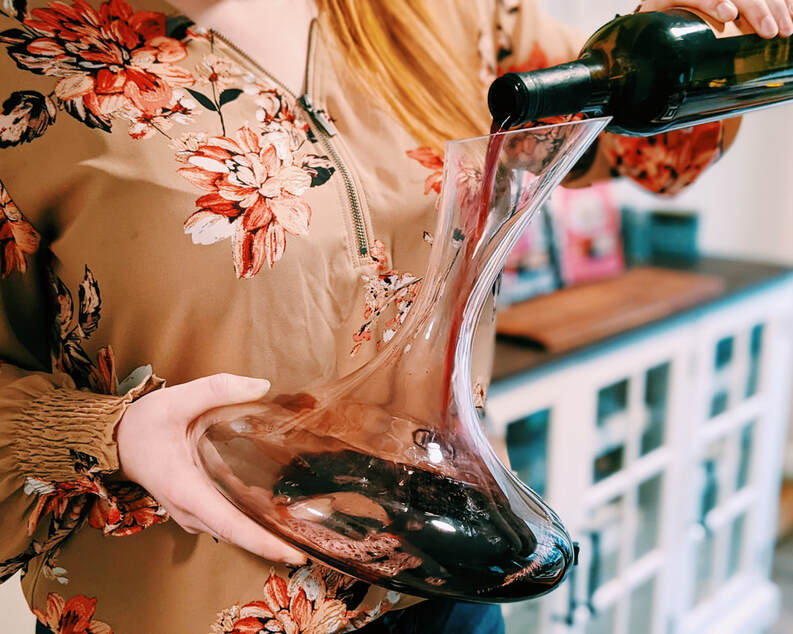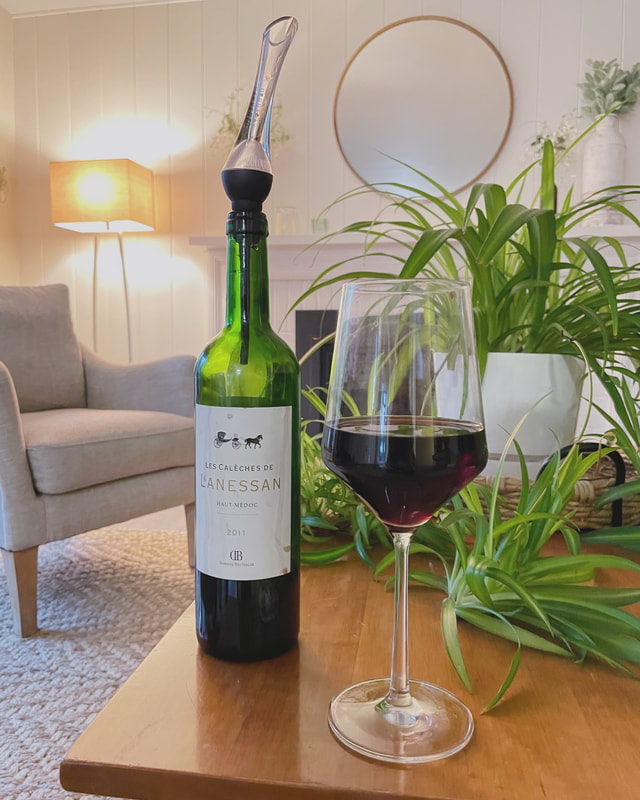The What, Why, and How of Decanting WineWHAT IS DECANTING? Decanting is simply pouring wine from the bottle into a separate vessel without disturbing any sediment at the bottom of the bottle. Thus, a decanter is the separate vessel you pour your wine into. WHY DECANT A BOTTLE OF WINE? There are two main goals that decanting achieves. First, if there is any sediment at the bottom of the bottle, decanting separates the delectable liquid from the bitter sediment . This sediment is completely natural and unharmful, usually developed from tannins in the wine that form chains that become so long that they fall out of suspension; however it is unpleasant to taste. There’s nothing worse than enjoying a sip of aged wine and suddenly getting a mouthful of bitter tannins thanks to the sediment. The second goal is to give the wine a chance to “breathe.” Simply put, the wine has been trapped inside a bottle with little to no oxygen and just needs a second to relax and open up, otherwise it could taste overly sharp or acidic. If you want to get more technical, there are two processes going on when you decant your wine: evaporation and oxidation. EVAPORATION & OXIDATION Evaporation is all about getting rid of the bad stuff. Evaporation happens almost immediately once you open and pour the bottle of wine into the separate vessel. During the evaporation process, alcohol is rapidly released along with certain aromatic compounds, specifically sulfur related compounds. When wine is bottled, winemakers often use a small amount of sulfur dioxide to keep the wine from going bad before it gets to the consumer. There’s nothing wrong with this practice, and it’s used almost universally. However, it can cause wine to smell reductive when it’s first opened (think rotten egg, matchstick, or even canned vegetables). When you decant your wine, these aromas will often evaporate off within just a short period of time, leaving you with all the good aromas to enjoy! Don’t just take my word for it! A 2016 study by the Journal of Agricultural and Food Chemistry found that wine left in an open glass container lost 1% Alcohol by Volume in just two hours. And lost 3.2% over six hours! This loss of alcohol often makes the wine taste smoother. Plus, they found the wine contained fewer volatile compounds (the ones that would make your wine smell like rotten eggs) after it had been sitting out. If evaporation is about getting rid of the bad stuff, oxidation is about developing the good stuff. While evaporation happens almost immediately, oxidation takes time. This is because oxidation transforms the compounds found in the wine into new aromas and flavors, rather than just moving the compounds around as evaporation does. Oxidation works by introducing the chemical compounds in wine to, you guessed it, oxygen which in turn, causes chemical reactions. Different wines react to oxygen in different ways, it all depends on what compounds are found in the wine. In order to get the full effects of oxidation, most wines need at least a couple hours and some could take days due to antioxidant compounds in the wine that prevent the oxidation process from happening. WHICH WINES SHOULD BE DECANTED? AND FOR HOW LONG? Going back to our two goals of decanting, there are two kinds of wine you should decant: old wine that has sediment at the bottom of the bottle, and young wines that need a chance to breathe. In the first case, you’ll want to pour the wine gently into a separate container right up until you start to see sediment in the neck of the bottle (use a flashlight or candle under the bottle when pouring to better see the sediment). Let the wine sit for a minute or two to allow the evaporation process to pull off any off-putting aromas, but don’t let it sit too long! Older wines can quickly lose their pleasant aromas if left in contact with oxygen for too long. As for the younger wines, almost all red wines can benefit from decanting--especially budget friendly bottles. If you want to transform an $8 Trader Joe's Cabernet Sauvignon, try decanting it for an hour or so. You’ll be amazed by the changes that can occur. Below are some general guidelines for decanting different styles of wine, but a lot of it comes down to judgement. If the wine tastes grippy (aka: pulls all the saliva out of your mouth) or sharp and spicy, the wine could benefit from decanting. If it smells a bit like sulfur, it could benefit from decanting.
*When it comes to decanting white or sparkling wines, you typically only want to do so if the wine presents very few pleasant aromas or any off-putting aromas such matchsticks or rotten eggs. DO I NEED A DECANTER TO DECANT WINE? Absolutely not! While decanters are pretty to look at, you can decant wine using any inert vessel. I’ve used a water pitcher on a few occasions as well as a clean glass vase once or twice. Pitchers are great because they have a lip for easy pouring, but the vase did the job too. Your main goal is to introduce the wine to oxygen and have a somewhat large surface area of wine open to oxygen for some amount of time. DOES AN AERATOR WORK THE SAME WAY? An aerator is a small device that wine can be poured through before being poured into a glass or decanter. It either sits on top of a glass of wine, or is fitted onto an open bottle of wine. The aerator rapidly introduces the wine to oxygen, quickening the process of oxidation to nearly instantaneous. So yes, an aerator has the same effect on a young bottle of wine as decanting does--and often in a shorter amount of time. As for older wine, stick with using a decanter. Aerators can overwhelm the wine and the sediment in older wine can clog an aerator. Pro Tip: For very young, tannic wines, double up and pour the wine into a decanter using an aerator! There you have it! Hope you enjoyed this crash course in Decanting. What questions do you have? Do you decant your wines? Will you now after reading this?
0 Comments
Leave a Reply. |
Topics
All
|



 RSS Feed
RSS Feed